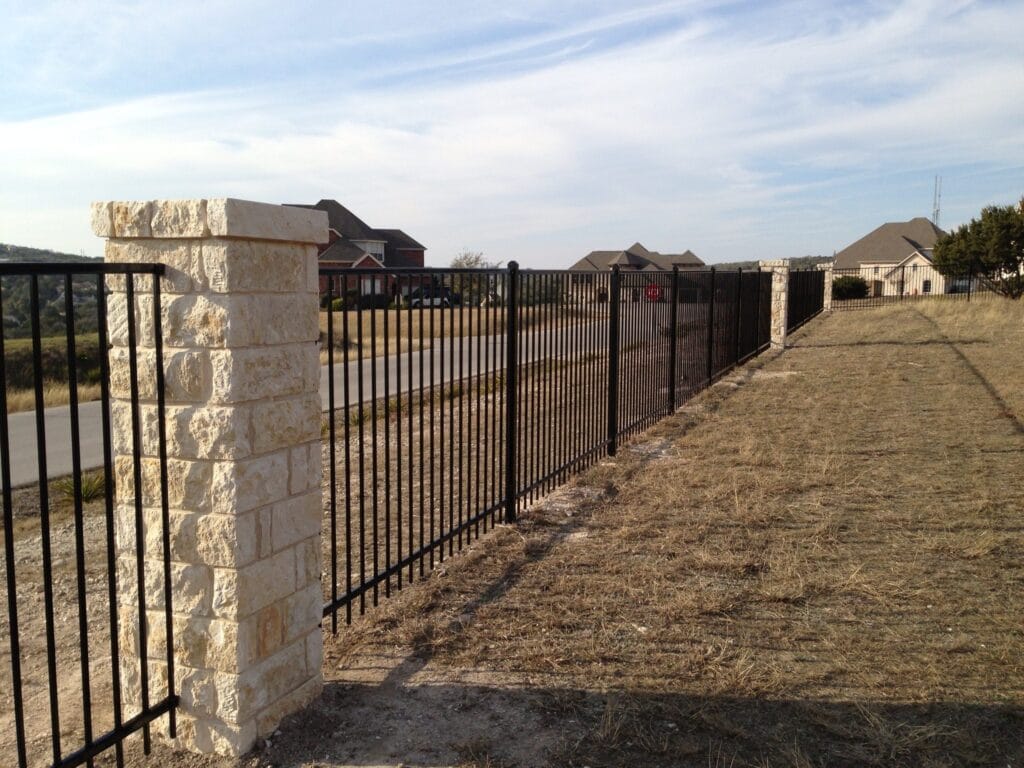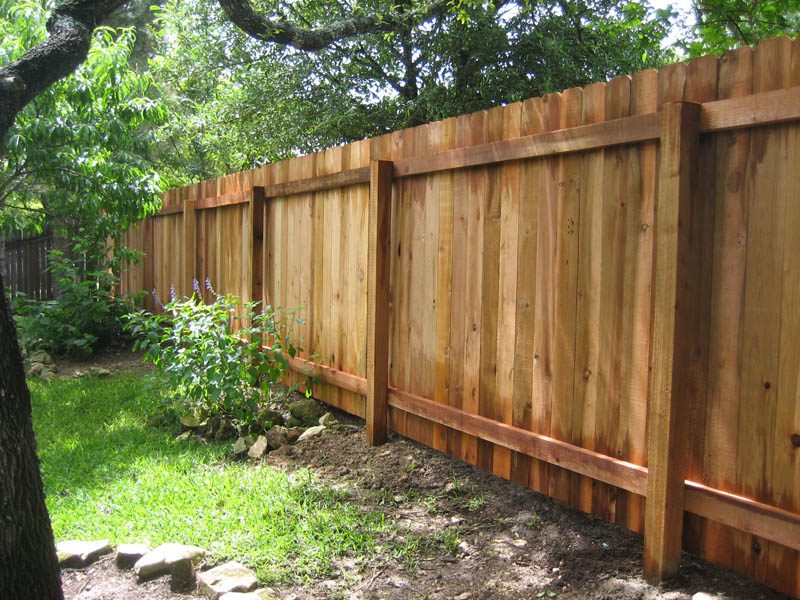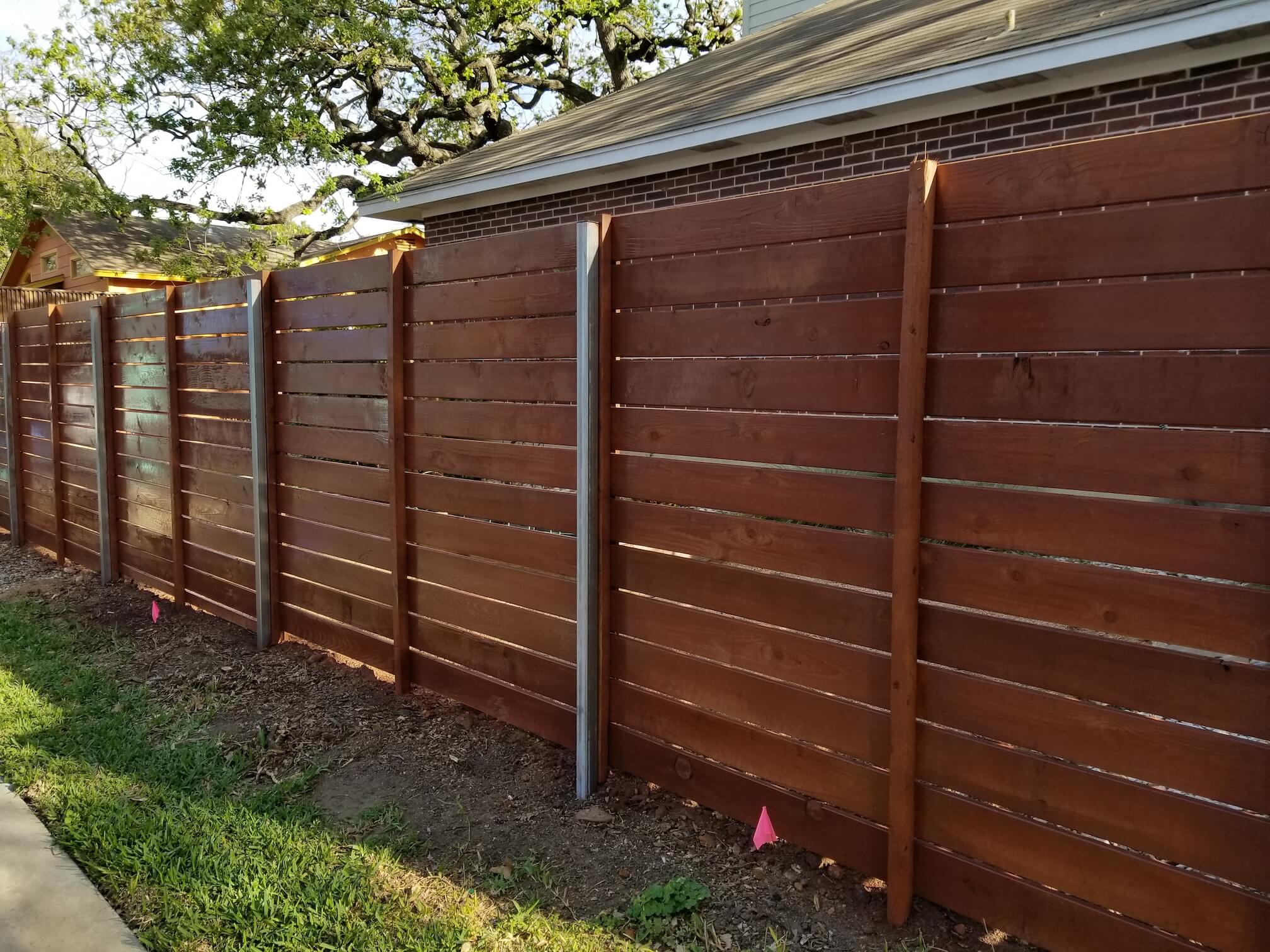Although you may have already selected a wood privacy fence, you still have one other decision that you will have to make – should you select wood or steel fence posts? While both options serve their purposes, there are several factors you need to consider before making your final selection. Below we will dive into the pros and cons of both wood and steel fence posts, and the characteristics of each!
Metal Fence Posts

Advantages
Durability
The first consideration when selecting between metal and wood fence posts is their durability. Steel posts won’t be affected by natural elements or termites, so they’re widely considered more durable than wood fence posts. Although steel is prone to rust, galvanized steel is not, and since fence posts are made with galvanized steel, rust is not a worry.
Low Maintenance
As with anything you buy, maintenance is part of the package. If you’re looking for something lower-maintenance, steel is going to be a better choice. As long as the steel posts are made from galvanized steel and are securely fastened, they’re essentially maintenance free.
Strength
Metal posts are very strong, able to withstand strong winds, and support heavy fences. This makes them a great choice for areas with extreme weather. Their strength also allows you to install taller fences without losing stability.
Aesthetics
Metal fence posts come in many colors and styles, so you can match them with your fence and landscaping. While some people might think metal isn’t as charming as wood, modern designs now offer many attractive options including decorative fence toppers.
Disadvantages
Cost
The largest cost differences between wood fence posts and steel posts are largely due to the cost of materials and installation costs. Galvanized steel poles have a larger initial expense, but they don’t have any maintenance costs associated with them. Typically galvanized steel fences, can cost anywhere from $30 to $100 each, depending on factors like size, thickness, and brand.
Installation
Installing metal fence posts can be more complicated than installing wood posts. It often needs special tools and skills, which might mean you need to hire a professional. This can increase the overall cost and time needed for your fencing project.
Wood Fence Posts

Advantages
Cost-Effective
Wood is cheap raw material and is easy to cut and hammer together, while steel is an expensive raw material, and you will need a professional to cut and install it. A standard pressure-treated wood post for a fence can range from $10 to $20, depending on size and quality. While wooden fence posts are initially cheaper, they do come with maintenance expenses like repairs and staining.
Aesthetics
Fences with wood posts offer an unbeatable natural and charming look, while fences with galvanized steel create a much more modern feel. Additionally, though there are some steel posts that can be concealed. Deciding between the two is really just dependent on your personal tastes and the design of your property – which style are you going to choose?
Ease of Installation
Wood fence posts are easier to install, especially if you like DIY projects. With basic tools and some know-how, you can usually do it yourself. This can save you money on labor costs and give you the satisfaction of finishing the project on your own.
Disadvantages
Maintenance
Wood fence posts are affected by moisture, weather and natural elements as we mentioned in the first section. Although wood can be stained and sealed for some protection, it’s not fool-proof and the stain must be reapplied. While you will only have to re-stain the fence every 2-5 years, you will have to take these expenses into account when budgeting for your fence.
Durability
Fences face harsh elements, like heavy winds and rainstorms, and unfortunately, wood fence posts aren’t always up for the challenge. With changes in moisture levels, wood fence posts can contract and expand, essentially warping the post. When a fence post is warped, it’s unsightly and can affect the longevity of the fence. The other disadvantage of a wooden fence posts is that they can be attacked by termites, leaving brittle wood in their wake.
Lifespan
Wood fence posts generally don’t last as long as metal posts. With proper care wood fences can last 7-15 years while steel fences can last up to 30 years. Over time, the cost of maintaining and replacing wood posts can add up.
Making Your Choice
When choosing between metal and wood fence posts, consider the following key points:
- Cost: Metal is more expensive at first but saves money in the long run because it needs less maintenance. Wood is cheaper initially but needs ongoing care.
- Durability: Metal lasts longer and handles harsh conditions better than wood, which can rot and get damaged by insects.
- Maintenance: Metal needs little upkeep, while wood needs regular treatment to stay in good shape.
- Aesthetics: Wood has a natural look that many people like, while metal offers modern and durable options.
Conclusion
Now that you understand the differences between fences with metal and wood fence posts, are you ready to get your fencing project started? Give Austin’s top fence builder Sierra Fence a call today for all of your fencing needs!
Frequently Asked Questions (FAQs)
What are the best types of wood for fence posts?
Cedar, pine, and redwood are popular because they naturally resist rot and insects. Treated lumber can also make wood posts last longer.
Can I mix metal and wood fence posts?

Yes, combining metal posts with wood panels can offer the best of both worlds—durability and aesthetics. This hybrid approach can also help your fence stand out.
How often should I maintain my wood fence posts?
We recommend regular maintenance every 2-5 years for wood posts. This includes staining or sealing to protect them from weather and pests.
